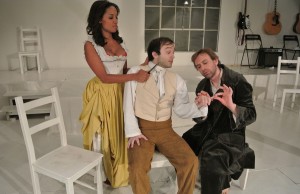Barn offers cheap, worthy entertainment
Red Barn, a new musical by the Independent Shakespeare Company, is nothing short of magnificent.
Don’t let the low-budget appearance of the set fool you — there is no part of this performance that feels amateur. The production’s all-white set serves as a pristine alternative to the traditional black box theater. The actors perform barefoot and hardly use any props. Overall, Red Barn is executed with a refreshing simplicity.

Cast over cash · Despite its low-budget set, Red Barn proves a worthy piece of entertainment. The play, based on a true story, entertains with stellar acting, strong vocal talent and original music composed by David Melville. – | Photo courtesy of Xavi Moreno
The plot, on the other hand, is wonderfully complex. Based on a true story, Red Barn follows the illicit affair between a mole catcher’s daughter and a wealthy gentleman in the small English village of Polstead in the 1820s. There’s murder, sex, pig stealing, heartbreak — and a circus. This story has it all, handling heavy themes with dark humor and a sharp sense of self-awareness.
David Melville, who wears many hats as co-founder of the company and the composer, lyricist, co-writer, guitarist and star of Red Barn, was born in England near Polstead, and grew up hearing the story of the doomed mole catcher’s daughter.
Melville provides stellar material in every arena of this musical. Regarding his acting, he portrays the shady ex-con Beauty Smith with a Tim Curry-esque zeal, growling through songs, joking about his rhyming lyrics and explaining that pigs are “financially remunerative things to steal — and very tasty.” Similarly irreverent dialogue overflows in the script and lyrics, providing the actors with content that they can run wild with — the team behind Red Barn seems to understand how enjoyable it is to watch actors have fun with their work.
Mary Guilliams plays Maria Marten, the mole catcher’s daughter, instilling every glance with an allure so intense it becomes almost disconcerting. All eyes are on her as she glides in and out of scenes with haunting grace; all of her reactions are compelling and natural. Guilliams is also an impressive singer, although her breathy style is atypical for a standard musical theatre ingenue. She powers through her songs with a retro, soprano flair more reminiscent of Zooey Deschanel or Norah Jones than Patti LuPone.
Guilliams’ fearless acting style swings into full force in the climactic Act I finale, but her real star moment comes in Act II with a stunning ballad called “Red Barn.”
But the highlight of this show is the original music. Composed by Melville, the songs sound as though they could be new singles by The Decemberists. Instead of beating the audience over the head with predictable melodies and rigid verse-chorus-verse-chorus structures, Melville’s work fits in nicely with the understated technical aspects of the play. The band consists of only guitars, bass and piano, many of which are played by actors who hop in and out of scenes to take up their instruments.
The music is by no means simplistic, though; many of the songs have complicated counterpoints and tough harmonies. The lofty lyrics combined with the acoustic arrangements yield a pleasant sound that fans of folk music will love, though it does seem like the inclusion of a drum set may have aided in building the tension in some numbers.
Another asset comes from the strong, versatile ensemble. These six actors are all endowed with tremendous vocal talent and broad acting ranges, allowing them to fill any necessary roles with apparent ease. The actors are at the top of their game in the silliest scenes, in which they parade around as a creepy carnival troupe and later as a group of prim little girls, complete with hair bows and a pillow fight.
Though this production is without much official choreography, the members of the ensemble all contribute exciting movement styles. In one song, they even provide some percussion by rhythmically clinking their teacups and spoons against one another. Another bold directorial choice keeps a few cast members sitting upstage at all times, watching scenes unfold downstage — perhaps meant to evoke the lack of privacy in life in a small village — and conveniently performing harmonies when necessary.
Before heading down to the Pantages and dropping hundreds of dollars for a chance to see Book of Mormon, consider Red Barn as a worthy (and cheaper) alternative. It might not have the expensive-looking company numbers nor giant set pieces that Book of Mormon does, but this performance provides an intimate entertainment experience that viewers will treasure.
